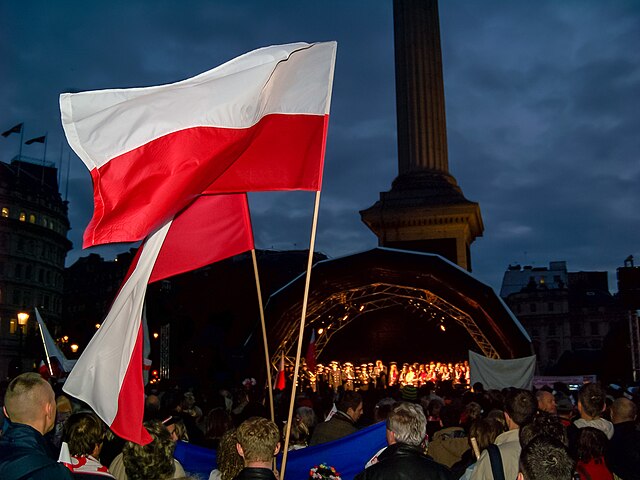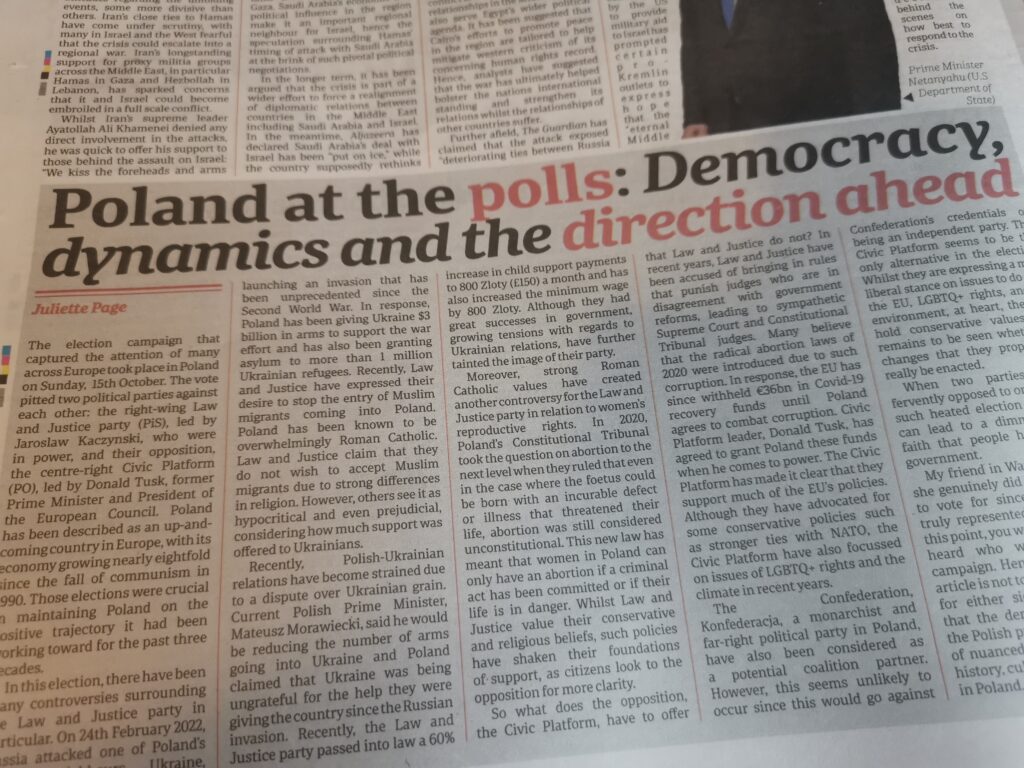Poland at the polls: Democracy, dynamics, and the direction ahead
The election campaign that has attracted the eyes of many across Europe took place in Poland on Sunday, 15th October. The vote pitted two political parties against each other: the right-wing Law and Justice party (PiS), headed by Jaroslaw Kaczynski, who were in power, and their opposition, the centre-right Civic Platform (PO), led by Donald Tusk, former Prime Minister and President of the European Council. Poland has often been described as an up-and-coming country in the European world, with its economy growing nearly eightfold since the fall of communism in 1990. These elections were crucial in maintaining Poland on the positive trajectory it had been working toward for the past three decades.

In this election, there have been many controversies surrounding the Law and Justice party in particular. On the 24th February 2022, Russia attacked one of Poland’s closest neighbours, Ukraine, launching an invasion that has been unprecedented since the Second World War. In response, Poland has been giving Ukraine $3 billion in arms to support the war effort and has also been granting asylum to more than 1 million Ukrainian refugees. Recently, Law and Justice have expressed their desire to stop the entry of Muslim migrants coming into Poland. Poland has been known to be overwhelmingly Roman Catholic. Law and Justice claim that they do not wish to accept Muslim migrants due to strong differences in religion. However, others see it as hypocritical and even prejudicial, considering how much support was offered to Ukrainians.
Recently, Polish-Ukrainian relations have become strained due to a dispute over Ukrainian grain. Current Polish Prime Minister, Mateusz Morawiecki, said he would be reducing the number of arms going into Ukraine and Poland claimed that Ukraine was being ungrateful for the help they were giving the country since the Russian invasion. Recently, Law and Justice party passed into law a 60% increase in child support payments to 800 Zloty (£150) a month and has also increased the minimum wage by 800 Zloty. Although they had great successes in government, growing tensions with regards to Ukrainian relations, have further tainted the image of their party.
Moreover, strong Roman Catholic values have created another controversy for the Law and Justice party in relation to women’s reproductive rights. In 2020, Poland’s Constitutional Tribunal took the question on abortion to the next level when they ruled that even in the case where the foetus could be born with an incurable defect or illness that threatened their life, abortion was still considered unconstitutional. This new law has meant that now women in Poland can only have an abortion if a criminal act has been committed or their life is in danger. Whilst Law and Justice value their conservative and religious beliefs, such policies have shaken their foundations of support, as citizens look to the opposition for more clarity.
So what does the opposition, the Civic Platform, have to offer that Law and Justice are not? In recent years, Law and Justice have been accused of bringing in rules that punish judges who are in disagreement with government reforms, leading to sympathetic Supreme Court and Constitutional Tribunal judges. Many believe that the radical abortion laws of 2020 were introduced, due to such corruption. In response, the EU has since withheld €36bn in Covid-19 recovery funds until Poland agrees to combat corruption. Civic Platform leader, Donald Tusk, has agreed to grant Poland these funds when he comes to power. The Civic Platform has made it clear that they support much of the EU’s policies. Although they have advocated for some conservative policies such as stronger ties with NATO, the Civic Platform have also taken on issues of LGBTQ+ rights and the climate in recent years.
The Confederation, Konfederacja, a monarchist and far-right political party in Poland, have also been considered as a potential coalition partner. However, this seems unlikely to occur since this would go against Confederation’s credentials of being an independent party. The Civic Platform seems to be the only alternative in the election. Whilst they are expressing a more liberal stance on issues to do with the EU, LGBTQ+ rights, and the environment, at heart, they still hold conservative values so it remains to be seen whether the changes that they propose will really be enacted.
When two parties are so fervently opposed to one another, such heated election campaigns can lead to a dimming in the faith that people have in their government.


My friend from Warsaw said that she genuinely did not know who to vote for since neither party truly represented her beliefs. By this point, you would have already heard who won the election campaign. Hence, the aim of this article is not to make an argument for either side but to make you understand that the democratic decision of the Polish public links to a series of nuanced facts that link to the history, culture, and recent events in Poland.
*This article was originally written for the Politics section of Palatinate, Durham University’s student newspaper.

Szymon Mazurczak, CC BY-SA 4.0 https://creativecommons.org/licenses/by-sa/4.0, via Wikimedia Commons:
https://commons.wikimedia.org/wiki/File:Polish_flags_on_Trafalgar_Square.jpg
